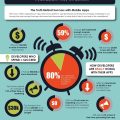How Successful Startups Leverage Technology to Gain a Competitive Edge
In today’s fast-paced business landscape, technology has become the great equalizer. No matter how small or new your startup is, leveraging the right technologies can help you compete with even the largest corporations. The most successful startups are those that have learned to harness the power of technology to drive innovation, efficiency, and growth.
In this article, we’ll explore the various ways in which successful startups leverage technology to gain a competitive edge. From data analytics and artificial intelligence to cloud computing and cybersecurity, we’ll dive into the key technologies that can help your startup thrive.
1. Data Analytics: Making Informed Decisions with Big Data
Data is the new gold, and startups that can effectively collect, analyze, and act on it are poised for success. By leveraging data analytics tools like Google Analytics, Mixpanel, or Tableau, startups can gain a deeper understanding of their customers’ needs, preferences, and behaviors.
With this information, they can make informed decisions about product development, marketing strategies, and customer engagement. For example, Airbnb uses data analytics to optimize its pricing strategy, ensuring that hosts earn the most money possible while keeping prices competitive for guests.
2. Artificial Intelligence (AI): Automating Tasks and Enhancing Customer Experience
Artificial intelligence is no longer a buzzword; it’s a reality that can significantly impact your startup’s bottom line. By automating repetitive tasks with AI-powered tools like Zapier, IFTTT, or Automation Anywhere, startups can free up resources for more strategic activities.
Moreover, AI-driven chatbots and virtual assistants are revolutionizing customer experience. Companies like Domino’s Pizza and Sephora have successfully implemented AI-powered chatbots to provide 24/7 support, reduce response times, and increase sales.
3. Cloud Computing: Scalability and Flexibility on Demand
Cloud computing has democratized access to enterprise-grade infrastructure, allowing startups to compete with larger rivals. Platforms like Amazon Web Services (AWS), Microsoft Azure, or Google Cloud Platform (GCP) offer scalable, on-demand resources that can be easily scaled up or down as needed.
This flexibility is particularly valuable for startups experiencing rapid growth or unexpected spikes in traffic. For instance, when the COVID-19 pandemic hit, Zoom’s cloud infrastructure enabled it to scale rapidly and meet the surging demand for video conferencing services.
4. Cybersecurity: Protecting Your Startup from Threats
As more businesses move online, cybersecurity threats are becoming increasingly common. Startups that prioritize security can avoid devastating data breaches, reputational damage, and costly fines.
By implementing robust security measures like encryption, multi-factor authentication, and regular software updates, startups can safeguard their assets and customer trust. Companies like Auth0 and Okta provide innovative identity management solutions to help startups stay secure in the face of evolving threats.
5. Internet of Things (IoT): Unlocking New Revenue Streams
The IoT refers to the network of interconnected devices that collect and exchange data. Startups can tap into this vast ecosystem by developing IoT-powered products or services that improve customer experiences, increase efficiency, or create new revenue streams.
For example, August Smart Locks uses IoT technology to provide smart home security solutions, while companies like Fitbit and Garmin have revolutionized the wearables market with their IoT-enabled fitness trackers.
6. Blockchain: Ensuring Transparency and Trust
Blockchain technology has far-reaching implications for startups across industries. By providing a secure, decentralized ledger for data exchange, blockchain can ensure transparency, trust, and accountability in business operations.
Startups like uPort and Civic are using blockchain to create innovative identity management solutions that empower users with control over their personal data. Other companies, such as Maersk and Walmart, have successfully implemented blockchain-based supply chain management systems to increase efficiency and reduce costs.
7. Virtual Reality (VR) and Augmented Reality (AR): Immersive Customer Experiences
Virtual and augmented reality technologies are transforming the way startups engage with customers, create immersive experiences, and drive brand loyalty. Companies like IKEA and Sephora have successfully integrated VR/AR into their marketing strategies to increase customer engagement and reduce returns.
By providing interactive product demos, virtual try-on, or gamified shopping experiences, startups can differentiate themselves from competitors and build lasting relationships with their target audience.
8. DevOps: Streamlining Development and Deployment
DevOps is a software development methodology that emphasizes collaboration between developers and operations teams to improve the speed, quality, and reliability of releases.
Startups that adopt DevOps practices like continuous integration, continuous delivery (CI/CD), and infrastructure as code can accelerate time-to-market, reduce errors, and increase customer satisfaction. Companies like Netflix and Amazon have successfully implemented DevOps to achieve faster deployment cycles and higher release quality.
9. Social Media Listening: Staying Ahead of the Competition
Social media listening involves monitoring social media conversations about your brand, competitors, or industry-related topics. Startups that leverage social media listening tools like Hootsuite Insights, Sprout Social, or Brand24 can gain valuable insights into customer sentiment, preferences, and pain points.
By staying ahead of the competition and responding promptly to customer concerns, startups can build a strong reputation, increase brand loyalty, and drive business growth.
10. API-Based Integration: Unlocking New Opportunities
APIs (Application Programming Interfaces) enable different software systems to communicate with each other seamlessly. Startups that leverage APIs can integrate their products or services with popular platforms like Facebook, Instagram, or Slack, unlocking new revenue streams and expanding their reach.
Companies like Stripe and PayPal have successfully used API-based integration to provide seamless payment experiences across various applications and websites.
Conclusion
In today’s fast-paced startup ecosystem, technology is the key differentiator between success and failure. By leveraging the right technologies, startups can drive innovation, efficiency, growth, and customer satisfaction.
Whether it’s data analytics, AI, cloud computing, or cybersecurity, the most successful startups are those that have learned to harness the power of technology to stay ahead of the competition. As a startup founder or entrepreneur, it’s essential to stay informed about the latest technological advancements and explore opportunities to integrate them into your business strategy.
Remember, technology is an enabler, not a silver bullet. It’s up to you to creatively apply these technologies to drive meaningful impact and achieve your startup goals.












